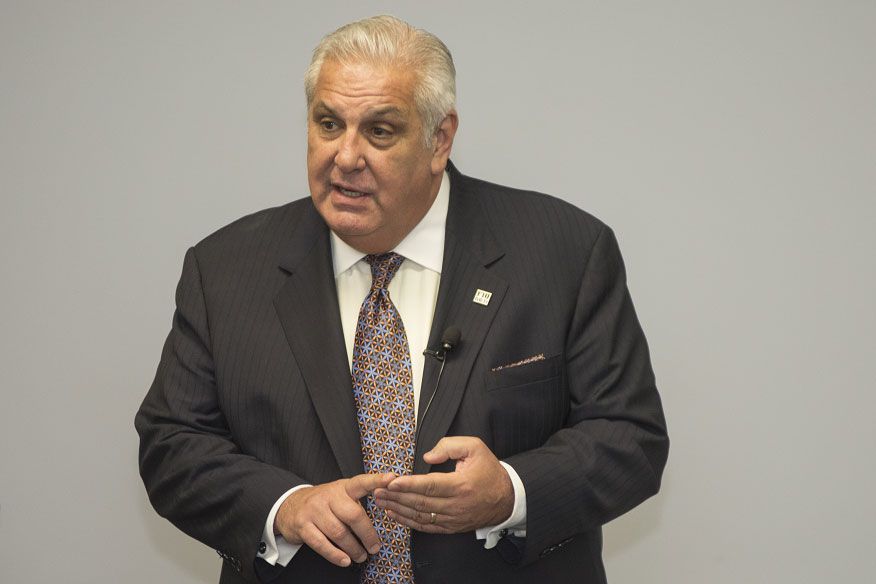
It was a question that Pedro “Joe” Greer, M.D., FACP, FACG, chair and professor of the Department of Medicine, Family Medicine, and Community Health at the Florida International University Herbert Wertheim College of Medicine, asked repeatedly: “When did it become socially acceptable in this country to refuse a patient care because they have no money?”
It’s that frustration that has spurred Greer, a 2009 Presidential Medal of Freedom awardee and a MacArthur Foundation Genius Grant fellow, to revolutionize his approach to medicine.
“Joe Greer is internationally recognized as a pioneer in medical education and a leading voice for those who are without access to health care and resources,” said Lawrence “Bopper” Deyton, M.D. ’85, M.S.P.H., senior associate dean for clinical public health and professor of medicine at the GW School of Medicine and Health Sciences (SMHS), as he introduced Greer as the inaugural lecturer of the Dean’s Distinguished Lecture in Clinical Public Health in early January. Later in the day, Greer presented a second lecture to SMHS students, as well as students from the GW School of Nursing and the GW Milken Institute School of Public Health.
Greer has spent his career reaching out to care for those who cannot care for themselves. In Miami, at the height of the “cocaine cowboy” era of mass drug use and high homicide rates in the early 1980s, Greer would venture to the city’s homeless encampments to provide care. Later, the gastroenterologist and hepatologist co-founded a clinic, Camillus Health Concern, to treat homeless and underserved patients.
Despite advancements in science and health care, Greer believes that to treat the whole person, it is imperative to focus on the root causes of illness, the “non-biologic causes of diseases, things you can see and things you cannot see: police violence; prejudice; lack of transportation; income differences; disparities in opportunities; and food deserts.”
Those social determinants of health, Greer said, are responsible for “80 percent of the causes of diseases in this country.” In the United States, he added, there is as much as a 30-year difference in life expectancy between white and black populations. “If we [physicians] are here because we don’t want to see people suffer, then we have to apply our intellect, our discipline, our analysis into turning this around. We need … to make this country better and healthier.”
Today, Greer is making a direct impact on health care delivery through the medical education curriculum at the Wertheim College of Medicine. There, under Greer’s tutelage, students are immersed in both the science of medicine and clinical public health, which is also a key component of SMHS’s M.D. curriculum. Wertheim students work in interprofessional teams and participate in long-term household-centered care. Longitudinal team-based home visits are integral to his model of health provider education, as is community engagement.
“The overwhelming majority of medical students do not come from these environments,” Greer said, describing the lower income areas where most of the patients reside. “But we are charged and morally responsible for their care. That means we have to take an extra effort to go out and learn about them. Not teach them; learn from them. They have more to teach us then we will ever, ever understand.”
Greer later shared that message with GW students, charging them to consider why they chose the health care field. “You’re in school because you want to help people,” he said. “You can make America better.” He urged students to consider the social determinants of health in their treatments and to remember their responsibility to care for all patients, not just those who can afford visits. Students would also do well, he said, to carry a notepad in the pocket of their white coats to detail their interactions with patients.
“Write down those stories,” he said. “Write down those interactions. Write down your feelings. Write down why you wanted to be a doctor, and always go back to that piece of paper.”
Greer ended his lecture with one his own stories. Having just returned to his clinic with lunch, Greer offered his sandwich to a waiting 6-year-old boy. “The little boy took the sandwich, took it out of the bag, out of the wrapper, broke it in half, took a couple of bites, and put it back in the wrapper, wrapped it up, and put it in his jacket,” Greer recalled. It turned out that the boy, whose family was homeless, had siblings; the boy, despite his hunger, wanted to share the sandwich with them.
“Every morning, I pray I can be that 6-year-old child, that I can go through life without prejudice,” Greer said. “It’s not about me; it’s about taking care of others.”
With that story resonating, Greer issued one more order to his student audience: “Go save the world. I’m going to love watching you do it.”


